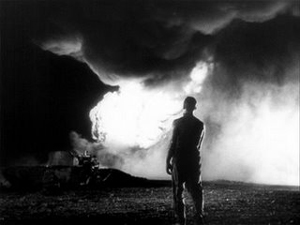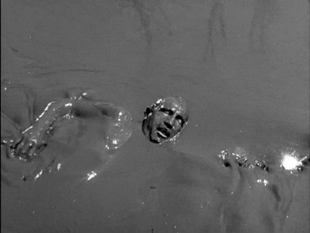
 |
|
|
|
The new release of Henri-Georges Clouzot's searing political suspense film The Wages of Fear only becomes more intense in the added resolution and clarity of Blu-ray. Many a foreign picture was condemned as propaganda in the 1950s, just as the exportation of a few American films (like the juvenile delinquency picture Blackboard Jungle) was 'discouraged' so as to suppress negative images of the U.S. abroad. Most foreign "agitation" efforts were simply refused import but The Wages of Fear was just too entertaining to be shut out completely. This uncompromising, bleak thriller received a release in the United States only after a two-year delay, and after twenty minutes or so of acidic content were excised. The Wages of Fear is from a book by a French expatriate who witnessed conditions in South American mining regions. One doesn't have to be Che Guevara on a motorcycle to see that most of what it reports is true. The tough, exciting film version is a meat grinder of suspense that doesn't flinch from its philosophy of universal bleakness -- there are no heroes among these desperate men risking death for a grubstake paycheck.
Writer Georges Arnaud's 1953 view of human nature openly attacks the notion that business and industry are run according to rules of fair play and goodwill. The Wages of Fear's Southern Oil Company controls an impoverished corner of a Latin nation and wastes no time or money bettering squalid local conditions. The SOC is also the only Law in Las Piedras. Private security armed with machine guns stands ready, presumably to suppress potential dissent. 
The Wages of Fear shows the production-minded Yankee oilmen playing a particularly ugly game of life and death. Some of the "bums" in town are criminals and adventurers, caught penniless in a place where money is required both to stay and to leave. The only way in or out is by plane, and raising the airfare is impossible without an SOC job. Some of the vagrants are workers fired by the SOC and "thrown away". Las Piedras is an economic circle of Hell, where dismissal might as well be a death sentence. Those lucky to have a meager source of income watch the others starve. The SOC's callousness is beyond measure. To avoid responsibility, they blame the deadly oil fire on the bandaged and maimed victims. They offer the suicidal explosives transport job to the unemployed foreigners as if bestowing a favor. Mario, Jo and the rest accept SOC's offer as a fatalistic challenge. The men compete and cheat one another to be picked to drive two trucks up to the oil camp. One man even commits murder to secure a slot. Such things are trifles in a place without ethics or virtue. Monsieur Jo is a case in brutality while the handsome Mario is almost sadistic in his treatment of Linda, the maid who pledges a dog-like devotion to him. She in turn is the virtual sex slave of the indolent café owner. Folco Lulli and Peter Van Eyck are the other driving team, a softhearted Italian with health problems and a proud German with a suspect background. This unstable foursome must work as a team, reminding us of other stories about factious male groups under pressure. Robert Aldrich's The Flight of the Phoenix has some similarities, especially the early death of a sentimental young Italian who doesn't make the cut for the harrowing truck run. But Clouzot's hard-bitten attitude toward human nature steers The Wages of Fear in the direction of Luis Buñuel and Sam Peckinpah: nobody exists in a state of grace. SOC management is ruthless because the company expects maximum profits and considers all other values secondary. The trapped vagrants quickly lose respect for human dignity. Nobody is innocent, not even the locals or their children who play naked in the rancid puddles, like pigs. In a scene shocking for 1953, Linda prays at an altar at the base of a tree, and slowly discovers that a man has hung himself behind the statue of Jesus. The long truck haul is one of the most famous extended suspense sequences in film history. It's not a race, as the trucks driven at specific speeds to avoid jarring their delicate cargo. Fate puts daunting obstacles in their path. A giant boulder must be removed with explosives. A hairpin turn next to a cliff can be navigated only by backing the trucks out on a crumbling wooden platform. The men hold up well considering the constant threat of being blown to smithereens; all except for Jo, the tough guy. The pressure reveals his macho posturing to be a bluff and even Mario's bullying can't keep him from whimpering in fear. The uphill trek proves to be a horrible ordeal. 
The traditional pattern for this kind of "adventure" film usually demonstrates that any hardship can be overcome, that group loyalty and sacrifice will redeem the worst of men. In The Wages of Fear Arnaud and Clouzot refuse to play that game. Camaraderie is worse than an illusion: it's a joke. The film insists that man's best efforts come to less than nothing when harnessed by unfeeling bosses and owners. Anyone ever exploited by an employer will feel a personal stake in the story, which makes its extreme case without uttering a single political speech. Clouzot purposely dashes audience expectations by offering a happy ending and then snatching it away. The director wants his adventure film to have the most downbeat finale imaginable. Criterion's Blu-ray of The Wages of Fear is its third iteration of the title, replacing a restored 2005 DVD but retaining its fine extras that concentrate on the career of director Henri-Georges Clouzot. A 2004 French documentary uses new interviews to recount the hard times when Clouzot was accused of collaboration and banned from working for two years. Clouzot's brother and writing partner, his second wife, and actors like Brigitte Bardot testify to his character and talent. Great film clips are offered from other Clouzot pictures including an interesting selection in which Peter Ustinov is seen acting in French. But viewers who have not seen the masterpiece Les Diaboliques should be warned that a film clip spoils one of its key scenes. An extra called Censored isolates some of the scenes dropped by the American distributor DCA, which also cleaned up with imports like Rodan and The Crawling Eye). Although much footage was trimmed simply to knock down the film's running time, the snippets offered here impute political motivations. The SOC foreman O'Brien callously announces his decision to put men in harm's way for expediency's sake, and makes the sarcastic observation that, should the "bums" in the village be blown to bits, they have no relatives to cause trouble later on. Actually, the charge that the film was bowdlerized to remove anti-American content is difficult to make stick, as no cutting can remove the basic situation of the oil company exploiting a captive work force. The shorter cut doesn't make the drivers seem any nobler, either; they are actively complicit in their own degradation. Curiously, the trims include moments of tenderness and physical contact between the drivers. The editorial implication is that homosexual overtones were being removed, when, in all likelihood, those moments were simply perceived as inessential and easy to drop. The same goes for Jo's final bleak assessment of human dreams, his vision of the afterlife: "Nothing! Nothing!" There's no need to credit DCA's editors with the ability to identify and weed out Sartre existentialism. On the other hand, that blasphemous suicide at the altar was probably the first thing to go. Interviews new and archival are included with assistant director Michel Romanoff, author Marc Godin, and star Yves Montand. The insert booklet presents a perceptive essay by author Dennis Lehane, but omits the earlier edition's interview excerpts with cast and crewmembers. We've previously seen Criterion pare down their insert booklet contents to fit the slimmer Blu-ray cases, but this title is packaged in a slightly smaller version of a standard keep case for DVDs, which has plenty of interior space. After removing the plastic wrapping with its blue sticker, one must look carefully on the back of the box to find the Blu-ray logo down in the corner. Not only is a possible source of confusion, we miss the space-saving thinner cases!
On a scale of Excellent, Good, Fair, and Poor,
The Wages of Fear Blu-ray rates:
Reviews on the Savant main site have additional credits information and are often updated and annotated with reader input and graphics. Also, don't forget the 2009 Savant Wish List. T'was Ever Thus.
Review Staff | About DVD Talk | Newsletter Subscribe | Join DVD Talk Forum |
| ||||||||||||||||||